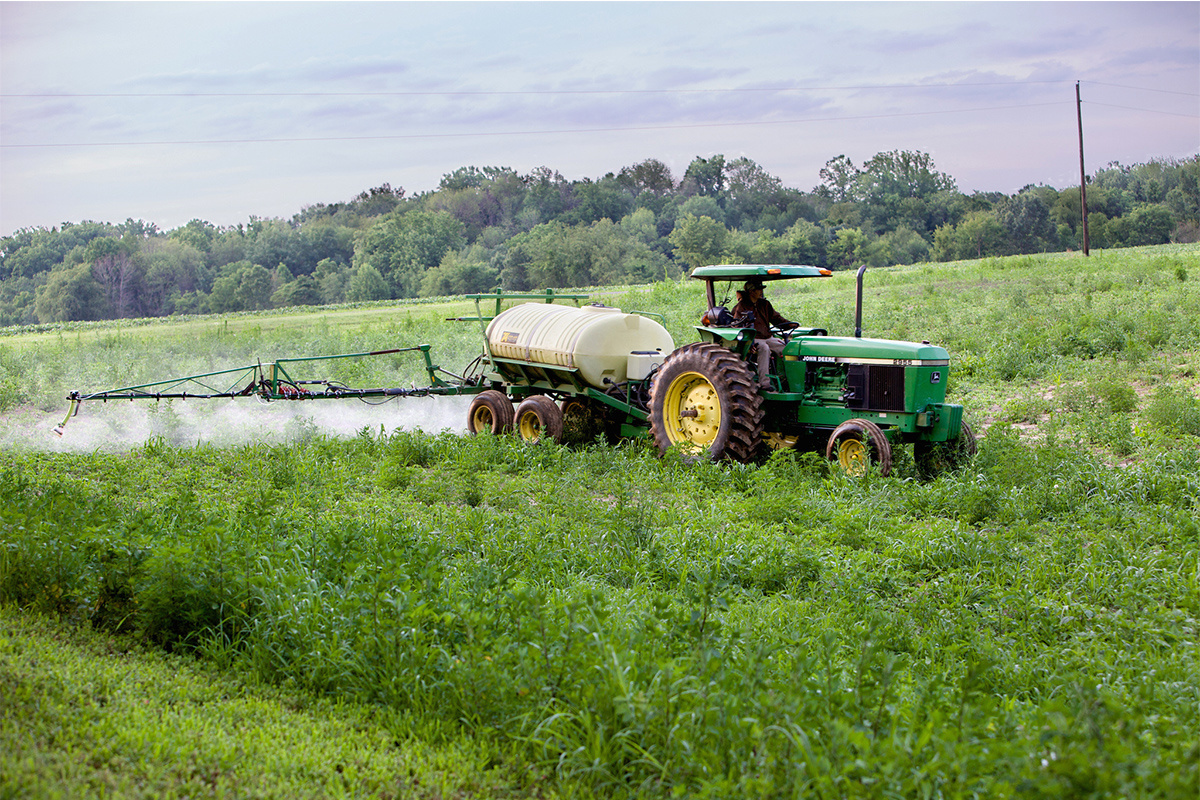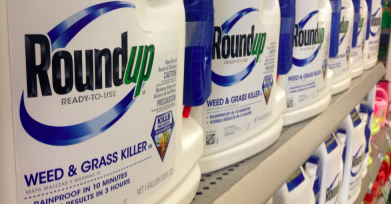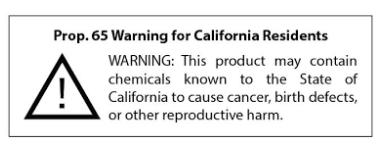

By Zen Honeycutt
A California federal judge ruled on Tuesday that the public does not need a warning label to inform us that cancer-causing and harmful chemicals in glyphosate herbicides are in our food or products, temporarily relieving manufacturers from the responsibility of being honest with their customers. At a time when more and more American families are struggling with diseases and their high cost, one man decided that it was an injustice to the chemical companies to have to tell us about the presence of their chemicals.
Senior United States District Judge William B. Shubb released his ruling regarding the case of Wheat Growers and Monsanto against the California Environmental Protection Agency (CA EPA), Office of Environmental Health Hazard Assessment (OEHHA) and the CA attorney general to remove glyphosate, the declared active chemical ingredient in Roundup, the most widely used herbicide in the world, from the CA Prop 65 carcinogen list, a law approved by California voters by ballot initiative in 1986.

The judge ruled that OEHHA can keep glyphosate on the Prop 65 carcinogen list but the manufacturers such as Monsanto and food producers will not have to label their products with a warning label. Normally, the law states that products containing chemicals on the list, above a certain level, must label their products within a year from the listing. The label would state, “WARNING this product contains a chemical known to the state of California to cause cancer or reproductive harm.” The temporary preliminary injunction granted by the judge halts the impending labeling by manufacturers of products and foods containing glyphosate and allows them not to inform their customers of this fact … that glyphosate has been found to cause cancer in animals and to be a probable human carcinogen.
The result is that OEHHA acknowledges glyphosate-containing products can cause cancer, but cannot require the manufacturers of such products to warn consumers because it could negatively affect corporate profits.
This one judge, one man, who could not even pronounce “glyphosate” at the beginning of the hour long hearing, has just changed the law and effectively hidden the known cancer-causing effects of glyphosate from not only Californians, but from an entire nation looking to California to lead the way in health regulations.
One must ask: Why doesn’t this judge want you to know what you are eating? Why wouldn’t he think it wise to inform the public that cancer causing chemicals are in our food? Is it not a matter of public interest that the chemicals in this herbicide, itself an antibiotic by patent, has been proven to be neurotoxic, genotoxic, endocrine disruptors, which can lead to mental illness and increasing depression and acts of violence, are in our children’s peanut butter sandwich? Why aren’t couples with infertility being told that the wheat snacks they are eating are likely keeping them from getting pregnant? Why aren’t parents allowed to know that the non-organic orange juice and oatmeal they are giving their baby or the hummus that they eat for lunch contains high levels of glyphosate herbicide which has been proven at ultra low levels to cause nonalcoholic fatty liver disease?

The answer appears to be that the judge did not consider the evidence before him. He stated that “on the evidence before the court the required warning for glyphosate does not prove to be accurate and uncontroversial” citing that “almost all other agencies have proven that glyphosate is not carcinogenic.” This is simply untrue. Health and regulatory agencies of Argentina, Australia, Belgium, Bermuda, Brazil, Canada, Columbia, Denmark, El Salvador, England, France, Germany, Italy, Luxembourg, Malta, Netherlands, New Zealand, Portugal, Scotland, Spain, Sri Lanka, Sweden, Switzerland and six Middle Eastern countries, including Saudi Arabia, Kuwait, the United Arab Emirates, Qatar, Bahrain and Oman have issued outright bans on glyphosate, imposed restrictions or have issued statements of intention to ban or restrict glyphosate-based herbicides, including Roundup, over health concerns and the ongoing Roundup cancer litigation.
Moms Across America and the National Health Federation with Tipps & Associates filed an Amicus brief, filled with evidence which does not appear to have been considered.
The Feb. 26, 2018 OEHHA Prop 65 ruling clearly panders to the chemical company, Monsanto, who argued that the listing and labeling of their products would lead to “irreparable harm” because public and private “enforcers” would sue, causing them to lose vast amounts of resources and loss of sales. What about the irreparable harm to Mary, California mother of two, whose father and son were both exposed to Roundup during backyard garden use, and both contracted non-Hodgkin lymphoma?
What about the irreparable harm to the mothers who spoke up at the Monsanto Tribunal whose sons were undergoing more than 60 surgeries for birth defects which were linked to exposure to glyphosate herbicide during their pregnancy? What about the irreparable harm to our nation due to the health issues and skyrocketing health care costs which have been connected to glyphosate herbicides?
Did the judge consider the evidence of collusion between Monsanto and U.S. Environmental Protection Agency employees to cover up the carcinogenicity of glyphosate from the public? Or did he ignore the ghost writing, manipulation of science and lack of safety of the final formulation of glyphosate herbicides?

The impact of this ruling is that, unless further legal action is taken, consumers will not see warning labels on food informing them that they contain the cancer-causing glyphosate herbicide. Activists and non-profit organizations that have been testing food items for glyphosate will not be able to hold food companies accountable and sue on the grounds of not labeling their products. Consumers will not see a label on Roundup, warning them of cancer-causing chemicals within the products and they will continue to use Roundup where their children, grandchildren and pets play.
This ruling magnifies an enormous problem within our government. We elect politicians into office and expect them to protect us, and they don’t. In addition, judges are appointed by our elected officials, and the opinion of that one person can supersede the law of an entire state or nation. This judge, appointed by President Bush in 1990, did not display any knowledge of the effects of this chemical or the process in which a chemical is listed as a carcinogen. When he asked if the chemical was harmful, the lawyer on the OEHHA side did not give a sufficient response. Monsanto’s lawyer argued vehemently that the carcinogenic issue was contested and the decision of one agency should not require them to “falsely” label their products. Clearly, all Monsanto had to do was instill doubt regarding the harmful effects of the chemical in order to win their case.
OEHHA’s Sam Delson commented on the case, “While the court granted the request for a preliminary injunction regarding the warning requirement, the court denied the request for a preliminary injunction on the listing itself. The court stated, ‘plaintiffs have not shown a likelihood of success on the merits of their claim that the listing of glyphosate violates the First Amendment … ‘ We are pleased that the listing of glyphosate remains in effect, and we believe our actions were lawful. We have not decided whether to appeal the ruling.”
Once again, big corporations have influenced the policies of our regulatory agencies and are getting away with hiding the truth about harmful chemicals and our food supply. Once again, activists wonder what it will take to have justice in our country, safe food, and a nation we can be proud of. Clearly, if we wait for our government to do the right thing we will be waiting forever. The answer continues to be … it is up to consumers to get informed, to test even more, share information, and refuse to buy products which contain harmful chemicals and stop supporting a system of corruption and poison.
'Dangerous Drift-Prone Pesticide' Threatens Millions of Acres, Hundreds of Endangered Species: Farmers and Conservationists Sue EPA, Monsanto https://t.co/5TIpNwm6q1
— The Progressive (@1Progressivism) February 13, 2018
Zen Honeycutt is founder and executive director of Moms Across America.

 233k
233k  41k
41k  Subscribe
Subscribe 